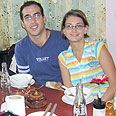
Israelis in Budapest: We live in fear
Jewish Agency reports of sharp rise in number of anti-Semitic incidents around world, especially in Eastern Europe. On Saturday, Israeli students attacked by metro inspector in Hungarian capital simply for speaking Hebrew
A grim picture. In the recent period there has been a sharp and drastic surge in the number of anti-Semitic incidents in Eastern Europe.
Israelis who live in Hungary and study medicine say how lately there has been a sharp rise in xenophobia in the country, on the background of the political instability in the country since beginning of the right-wing demonstrations against the government two months ago.
On Saturday, Itai Lavi, 28, an Israeli medical student studying in Budapest was attacked by a Metro inspector.
"I was returning home from the gym in the train with two friends of mine," Lavi told Ynet. When the metro inspector heard us speaking in Hebrew, he asked us why we do not speak Hungarian, and asked if we were from Israel. When we replied that we were, he began yelling at us 'go away from here, we don’t want you here'. We didn’t keep quiet and it quickly became physical."
More than the violence of the inspector, the thing that bothered Lavi the most was the indifference of the people passing by. According to Lavi, "everyone stopped and looked at us, but nobody did anything. Nobody helped, or asked why, or thought something was wrong. This is what is worrying. This is the feeling."
Shlomo Mola, a member of the management of the Zionist Federation and the Jewish Agency, and is responsible for the fight against Anti-Semitism, has returned last week from an international conference dealing with the fight against anti-Semitism which was held in Hungary.
"We returned very troubled from the harsh numbers about the rise of anti-Semitism, especially in Eastern Europe. I think that in Israel people are not aware of the cancer that is spreading in the world, to the huge rise in anti-Semitism. They don't hate us only in Iran, but also in Europe. This is horrifying: caricatures, vandalism, and aggression against Jews wearing yarmulkes, or speaking Hebrew."
He mentioned that the Jewish Agency is working diligently these days on plans to strengthen the Jewish leadership in the Jewish communities.
Passports ready
There are about 100,000 Jews living in Hungary today, 80,000 of them living in Budapest. Lavi is convinced that the internal political problems which have rocked Hungary in the past weeks, emphasize that xenophobia, especially against Jews and Israelis.
"I have lived here for five years, and since the far-right demonstrations against the prime minister, Jews have been really afraid. Jewish friends of ours suggested we don't leave our homes. It is not safe to walk around like it used to be.
"Lately we have been hearing about more and more violent acts," he added. "There is a larger tendency for nationalism. I am sure that all foreigners are hurt from that not only us. A few weeks ago during the riots, many Jews had already prepared their passports to leave the country. Many Jews also had anxiety attacks."
There are currently about 1,000 Israeli students studying in Hungary. Lavi and his friends have no intention to stay in Hungary past their studies.
"If I would have started my studying this year, I wouldn't have continued, but this is my final year. School in Hungary was a great experience and a lot of fun, but lately it has changed. There is much more racism, he said.
Another Israeli medical student, Tamir Glazer, 29, shares Lavi's sentiments.
"About a month and a half ago someone sprayed graffiti of a swastika and the symbol of the SS, near my house and nobody ever bothered to erase it. The Jewish friends who study with us say that there has always been anti-Semitism in Hungary, but there is no doubt that now there is a rise in the level of hatred. The hope which keeps us here is that we are returning to Israel soon," he said.
Glazer added: "One of my friends, a Jew who was born in Hungary, and is a medical student my age, says that as time passes by he does not see Hungary as a place to live. He doesn't feel any connection to it and it is getting worse."
He said, however, that the older population in the Jewish community is more skeptical, and they are not sure that the situation in Israel is better.
- Initial information received via Red Email










